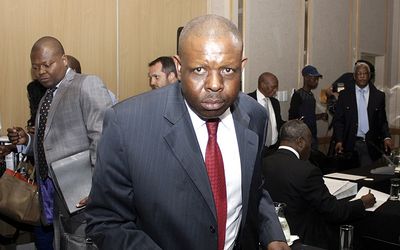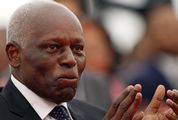A SUPREME Court of Appeal judgment has cleared the way for the long-delayed misconduct tribunal against Western Cape Judge President John Hlophe to go ahead.
The gross misconduct complaint against Judge Hlophe — potentially impeachable — has been pending for almost eight years now without resolution.
In an unprecedented move, in 2008, all the then justices of the Constitutional Court complained to the Judicial Service Commission (JSC) that Judge Hlophe had met with two of its justices — Chris Jafta, then acting, and Bess Nkabinde — and tried to influence them in four highly sensitive and political judgments pending before the highest court.
The judgments all related to corruption charges against President Jacob Zuma. At the time, it was widely believed that these judgments were what stood between Mr Zuma ascending to the presidency of SA. But resolution of the complaint against Judge Hlophe was beset with delays, as a result of intervening litigation.
Supreme Court of Appeal Justice Mahomed Navsa had strong words on Thursday over the delay, saying it was tarnishing the image of the judiciary.
He said it was "unsettling" that Bantubonke Tokota SC, counsel for Justices Jafta and Nkabinde, had told the court that "this matter would never end, speculating without specificity that there would be ongoing challenges".
He said all sides had contributed to the delay. "There should a concerted effort on the part of everyone concerned for the matter to finally be put to rest."
The JSC was forced in 2011 by a court order to begin the whole disciplinary process against Judge Hlophe again, and established a tribunal in terms of the JSC Act.
Over the years, as the dispute dragged on, a new procedure for dealing with complaints was introduced by legislation. When ordered to begin again, the JSC decided to proceed under the new law.
The new law provides for a Judicial Conduct Tribunal to investigate complaints of potentially impeachable conduct and recommend a finding to the JSC.
The JSC established a tribunal in 2013. But it was challenged by Justices Jafta and Nkabinde, who said that, because the complaint was made under the old system, the new procedure should not apply.
But, like the High Court, the Supreme Court of Appeal rejected this argument. Justice Navsa said the use of the new procedure did not affect any of Justices Jafta’s and Nkabinde’s substantive rights, nor did it prejudice them in any way.
Justice Navsa also rejected the argument that it was unconstitutional for a Judicial Conduct Tribunal to u se a member of the National Prosecuting Authority to collect and lead evidence before it.
Justices Jafta and Nkabinde argued that it breached the separation of powers and the independence of the judiciary, because prosecutors were part of the executive.
But Justice Navsa said prosecutors were not part of the executive and were rather an integral part of the justice system.
He also agreed with the High Court that the role played by the prosecutor in a tribunal was to collect and lead evidence only; she did not make any final decisions.

Western Cape Judge President John Hlophe at a Judicial Service Commission tribunal hearing into his alleged misconduct. Picture:PUXLEY MAKGATHO
A SUPREME Court of Appeal judgment has cleared the way for the long-delayed misconduct tribunal against Western Cape Judge President John Hlophe to go ahead.
The gross misconduct complaint against Judge Hlophe — potentially impeachable — has been pending for almost eight years now without resolution.
In an unprecedented move, in 2008, all the then justices of the Constitutional Court complained to the Judicial Service Commission (JSC) that Judge Hlophe had met with two of its justices — Chris Jafta, then acting, and Bess Nkabinde — and tried to influence them in four highly sensitive and political judgments pending before the highest court.
The judgments all related to corruption charges against President Jacob Zuma. At the time, it was widely believed that these judgments were what stood between Mr Zuma ascending to the presidency of SA. But resolution of the complaint against Judge Hlophe was beset with delays, as a result of intervening litigation.
Supreme Court of Appeal Justice Mahomed Navsa had strong words on Thursday over the delay, saying it was tarnishing the image of the judiciary.
He said it was "unsettling" that Bantubonke Tokota SC, counsel for Justices Jafta and Nkabinde, had told the court that "this matter would never end, speculating without specificity that there would be ongoing challenges".
He said all sides had contributed to the delay. "There should a concerted effort on the part of everyone concerned for the matter to finally be put to rest."
The JSC was forced in 2011 by a court order to begin the whole disciplinary process against Judge Hlophe again, and established a tribunal in terms of the JSC Act.
Over the years, as the dispute dragged on, a new procedure for dealing with complaints was introduced by legislation. When ordered to begin again, the JSC decided to proceed under the new law.
The new law provides for a Judicial Conduct Tribunal to investigate complaints of potentially impeachable conduct and recommend a finding to the JSC.
The JSC established a tribunal in 2013. But it was challenged by Justices Jafta and Nkabinde, who said that, because the complaint was made under the old system, the new procedure should not apply.
But, like the High Court, the Supreme Court of Appeal rejected this argument. Justice Navsa said the use of the new procedure did not affect any of Justices Jafta’s and Nkabinde’s substantive rights, nor did it prejudice them in any way.
Justice Navsa also rejected the argument that it was unconstitutional for a Judicial Conduct Tribunal to u se a member of the National Prosecuting Authority to collect and lead evidence before it.
Justices Jafta and Nkabinde argued that it breached the separation of powers and the independence of the judiciary, because prosecutors were part of the executive.
But Justice Navsa said prosecutors were not part of the executive and were rather an integral part of the justice system.
He also agreed with the High Court that the role played by the prosecutor in a tribunal was to collect and lead evidence only; she did not make any final decisions.





















Change: 0.40%
Change: 0.47%
Change: -0.49%
Change: 0.53%
Change: 1.03%
Data supplied by Profile Data
Change: 1.71%
Change: 1.28%
Change: 0.40%
Change: 0.00%
Change: 1.64%
Data supplied by Profile Data
Change: -1.27%
Change: 0.00%
Change: 0.05%
Change: -0.08%
Change: 0.35%
Data supplied by Profile Data
Change: -0.02%
Change: 0.21%
Change: -0.06%
Change: 0.53%
Change: 0.70%
Data supplied by Profile Data